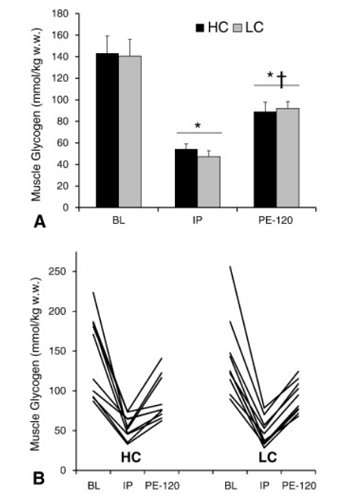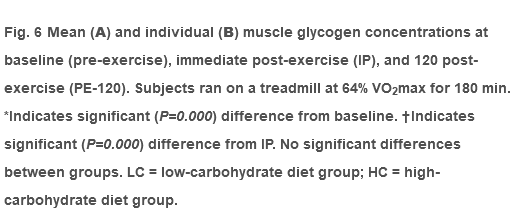I don’t believe so. The liver seems to be able to forge right into gluconeogenesis as soon as serum glucose drops low enough to make it necessary. The changes that result in what we call keto- or fat-adaptation seem to involve mitochondrial healing from the reduction in reactive oxygen species and the creation of new, healthy mitochondria. I believe there are other cellular adaptations the muscles go through, as well.
Fat Adapted: is it real?
I am at 10 weeks and find what you wrote very exciting. I have not had any “cheat days” since starting, only a few days of having a few more carbs than intended due to vegetables/salad dressings/nuts and whatnot, putting me over 20. Anyway, the idea that I might be able to switch so easily between eating or not, carbs or not, is super motivating. Thanks for sharing.
No, the fat-burning mechanism is not just in fat cells. Also, it was just an analogy to say that your body is NOT going to continue manufacturing something that’s NOT needed, just as it WILL start producing things that ARE needed. Within reason, of course, we’re never going to be able to use sunlight for energy.
Think of it this way. When you’re sick, your body starts cranking out more white blood cells. It doesn’t continue to do that after you’re well. Or, another example…when you start an exercise regimen, your blood volume will go UP (and stay up) so that you can more efficiently get oxygen to your cells. If you stop working out for several weeks, you’ll also LOSE that blood volume.
Ok but analogies don’t really help explain the biochemistry. The mitochondrial increase does make a lot of sense though.
I understand. Breakdown of fat is a relatively complex process…I’m lazy. You can find several studies and explanations of it just by googling.
Oh I wasn’t asking how fat is broken down. I was asking why or through what mechanism the body gets more efficient at breaking down fat during what we call fat adaptation.
if fat adaptation isn’t “real”, then i can’t conceptualize how i’m able to fast for multiple days at a time without feeling any form of discomfort or hunger throughout. definitely couldn’t comfortably go more than a few hours without eating when i was jamming myself with carbs all the time…
Good question!
But no satisfying answer.
The link to Virta, however, was useful to me. In the questions, after the article, a question about beta cells remained unanswered. I find this telling, as it is what we don’t know that scares us. But one question about high ketones in blood and leg cramps prompted an answer by the Virta staff to say that the person should eat more carbs! Have a carb snack, etc. It comforts me in my decision to up my carbs to 30g net carbs per day to reduce my severe keto cramps. And it’s working for me, so they’re spot on as far as I’m concerned. I’m not claiming it’ll work for anyone else!
But about the fat adaptation:
the second link in this thread is to a paper about ultra endurance athletes. Seriously? How applicable is it to obese, middle aged men and women? Many with some insulin resistance. Many menopausal.
I’ve read the blog of an ultra endurance athlete who does keto. She carb loads for her ultras. But still, how relevant is this for the common mortal? I exercise a lot, but I’m a lifetime away from being an ultra endurance athlete. What about the rest of members of this community?
The third link to paper/internet article of this thread is for a paper about… Fisher rats! They get more mitochondria with keto. Rats. I remember asking here about a paper claiming keto diet made mice diabetic and I was told, and I came to agree with it, that we aren’t mice! It was actually this comment that helped make me so critical about papers people link to without paying attention to what’s written. The subjects of the paper! Why we aren’t mice when it’s about becoming insulin resistant, but we are Fisher rats when it’s about getting more mitochondria?
The first link, to the Virta article (not a research paper, just an article on the internet), says that getting keto adapted (not fat adapted!) probably takes months, but they need to do research to understand what it means. Words mean a lot.
So, don’t we have anything better? Isn’t it amazing we talk so much about fat adaptation without science backing it up? If there’s finally research about it, with normal people as subjects of research, could someone post it?
We can talk about our own experiences, but that’s not science. N=1 is exciting for the 1, but isn’t science. I grew up among religious people. They could “prove” miracles existed! Everything good was god’s doing, everything bad was the devil. Bias is a b****!
Too much sugar causes mitochondrial damage (from glycation and oxidation), regardless of species, so it makes sense, mechanistically, to think that eating far less sugar would promote mitochondrial healing. I tend to think it was the reduced sugar that helped those rats. Rats are very difficult to get into actual ketosis, even if you feed them a diet that would cause ketosis in people (human beings are one of the very few species, possibly the only species, that can get into ketosis easily). The reason the “ketogenic” diet made the mice diabetic is that it was probably very high in sugar as well as fat, but the researchers were conditioned to blame the fat, and not even look at the sugar (thank you, Harvard School of Public Health!). In studies like this (and I would suggest the same for the fisher rat study, as well), it is very illuminating to look at what the animals were actually fed. There has been enough work done on human beings for us to be able to tell how generalisable the results of an animal model are to us.
A point I forgot to add:
Dr. Phinney has explained, in a couple of lectures on living low-carb/keto at Low Carb Down Under events (look on the LCDU YouTube channel), just exactly what processes he is referring to when he uses the term “keto-adaptation.” One process is mitochondrial healing, and the spawning of new mitochondria, the others seem to involve reviving dormant metabolic pathways.
older post and I get the OP wants ‘science to say’ ‘’‘this changes’’’ to make this happen BUT we all know:
Fat adaptation is a simple way of saying that you’ve taught your body to burn fat — rather than glucose — for fuel. Here’s how to do that: Slowly start reducing your intake of foods high in both carbs and sugars, and replace them with healthy fats and high-quality proteins.—etc
Now fat adaption is real. Point blank.
Exact science to support with one paper to say ‘it is real’ ain’t gonna go down that I can see 

Ketogenic body adaption is real. Hard science to boot just yet to cellular levels etc.? None I found.
Do we need to teach our bodies to burn fat? It is part of our natural state. It’s part of our evolution.
What’s the very purpose of fat cells we all have? They’re there because we burn fat for fuel.
When people lose weight, independent of the diet they’re following, the fat is being used as fuel. The natural thing.
Why, all of a sudden, we need to teach our bodies to do what they’ve evolved by doing?
I would think we are eating correctly to start the actual process it already knows to do. It isn’t we are teaching our bodies anything, it knows to do it, just it needs the correct food to activate it.
The issue is simply that, when we overwhelm our cells with glucose (carbohydrates are nothing more than glucose molecules joined in various ways), often over a period of years, the fatty-acid metabolic pathways become inactive from lack of use, and need to be reactivated. Furthermore, while the mitochondria can handle a certain amount of glucose, too much damages them (glycation and oxidation). Glucose can be metabolised outside of the mitochondria, so as long as we stick to a high-glucose diet, the cells won’t starve, but fatty acids can be metabolised only in the mitochondria, and it takes some time for the damage to heal and for new mitochondria to grow. I believe that production of certain catalysts and enzymes also needs to be restarted.
It makes sense. I think it’s just the first part, though: we know very well and can burn fat. However, we won’t if we’re full of glucose and the like.
Do you know of peer reviewed research papers that aren’t about rats, or super humans that validate what you said about the fat burning mechanism being deactivated when not in use, and the mitochondria being damaged by glucose, but becoming healthy again, or we getting new ones, when low carbing?
Not off the top of my head; however, there are references to such studies in the lectures by Stephen D. Phinney, M.D., Ph.D.; and by Jeff S. Volek, R.D., Ph.D.; at Low Carb Down Under events, preserved on LCDU’s channel on YouTube.
@Corals I’ll try to find something more directly relevant later today. I seem to recall a study done during the 1970s around the time Atkins came up with his diet. Just off the top of my head, there’s the Bellevue study of 1928-9 of Stefansson and Anderson. The first link is the study of their glucose tolerance following their year of eating meat and fat only:
Report, not the study, of the Bellevue experiment:

Stefansson, of course, was an advocate and writer:

I’m still trying to find a linkable version of Part 1 of the Harper’s articles.
Lessons In Living From The Stone Age:
I guess it depends on what you want.
How about this?
Took them at least a month.
Now, this used athletes either low carb or high carb, but was very interesting in that they had similar levels of muscle glycogen:
https://www.metabolismjournal.com/article/S0026-0495(15)00334-0/fulltext
And a lot of these studies are done on rats or mice, only because it’s a lot easier to do muscle biopsies and the like.





